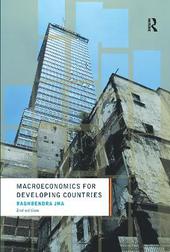
|
Macroeconomics for Developing Countries
Paperback
Main Details
| Title |
Macroeconomics for Developing Countries
|
| Authors and Contributors |
By (author) Raghbendra Jha
|
| Series | Routledge Advanced Texts in Economics and Finance |
|---|
| Physical Properties |
| Format:Paperback | | Pages:448 | | Dimensions(mm): Height 234,Width 156 |
|
| Category/Genre | Macroeconomics
Development economics |
|---|
| ISBN/Barcode |
9780415262149
|
| Classifications | Dewey:339.091724 |
|---|
| Audience | | Undergraduate | | Postgraduate, Research & Scholarly | | Professional & Vocational | |
|---|
| Edition |
2nd Revised edition
|
| Illustrations |
bibliography, indexes
|
|
Publishing Details |
| Publisher |
Taylor & Francis Ltd
|
| Imprint |
Routledge
|
| Publication Date |
13 March 2003 |
| Publication Country |
United Kingdom
|
Description
This comprehensively revised and updated edition develops the themes contained in the first edition. Students and teachers who are familiar with the book will notice that half of the chapters are entirely new, with the other half having changed significantly to take into account the changes that have occurred in the global economy since the turn of the millennium.With questions for discussion and the use of case studies, the book covers such themes as: standard closed and open macroeconomic models; a full evaluation of the post-Washington consensus model; IMF stabilization programmes and their effects on developing economies; the pressing problems of indebtedness; and financial sector reforms in developing countries. This textbook is a useful accompaniment for students of development economics and should prove popular with lecturers and academics alike.
Reviews'Macroeconomic policy is one of the most important area of development strategy. But until now we have lacked a guide to the macro-economics of developing countries. With the publication of the second edition of Raghav Jha's 'Macro-economics for Developing Countries', we now have an incisive and well-balanced view of some of the most urgent and important issues for facing the poorer world.' - Tony Addison, Deputy Director, World Institute for Development Economics Research, United Nations University
|